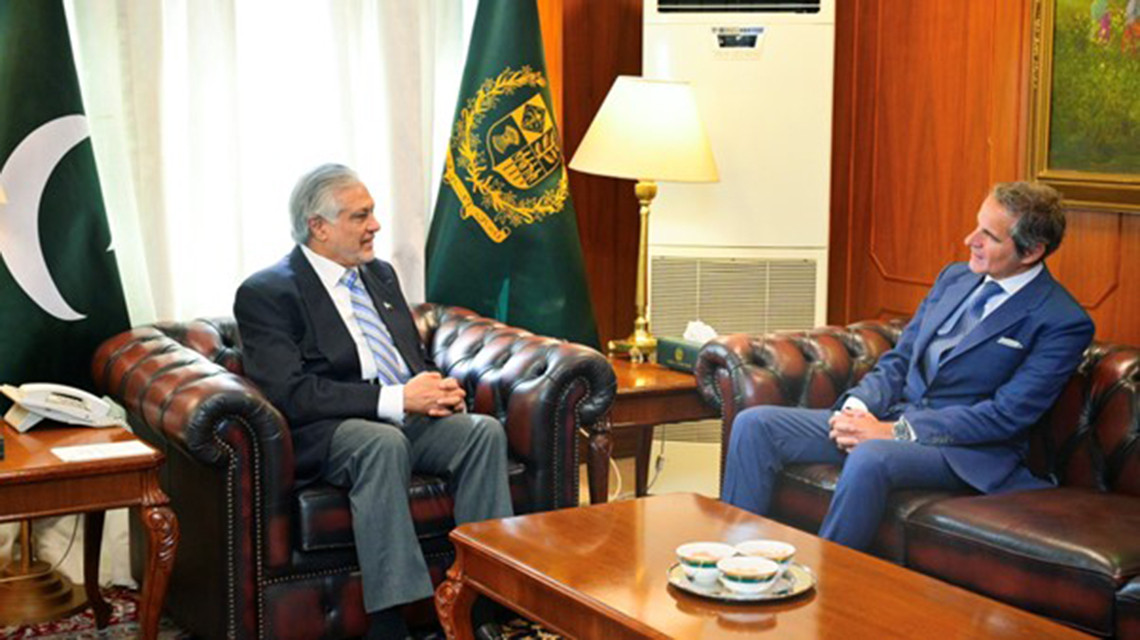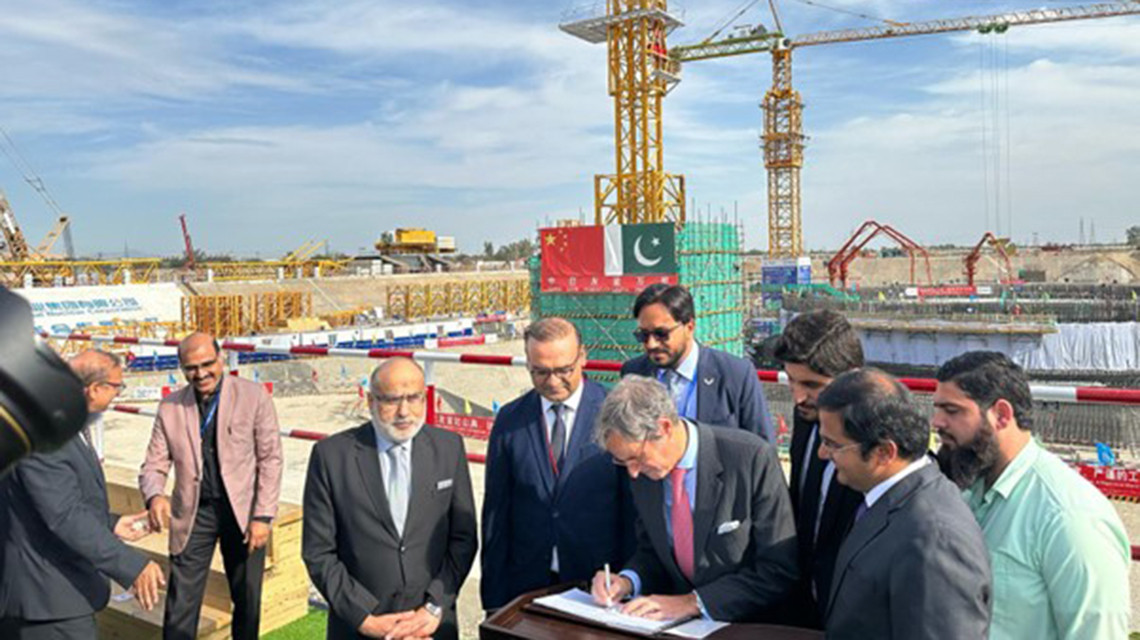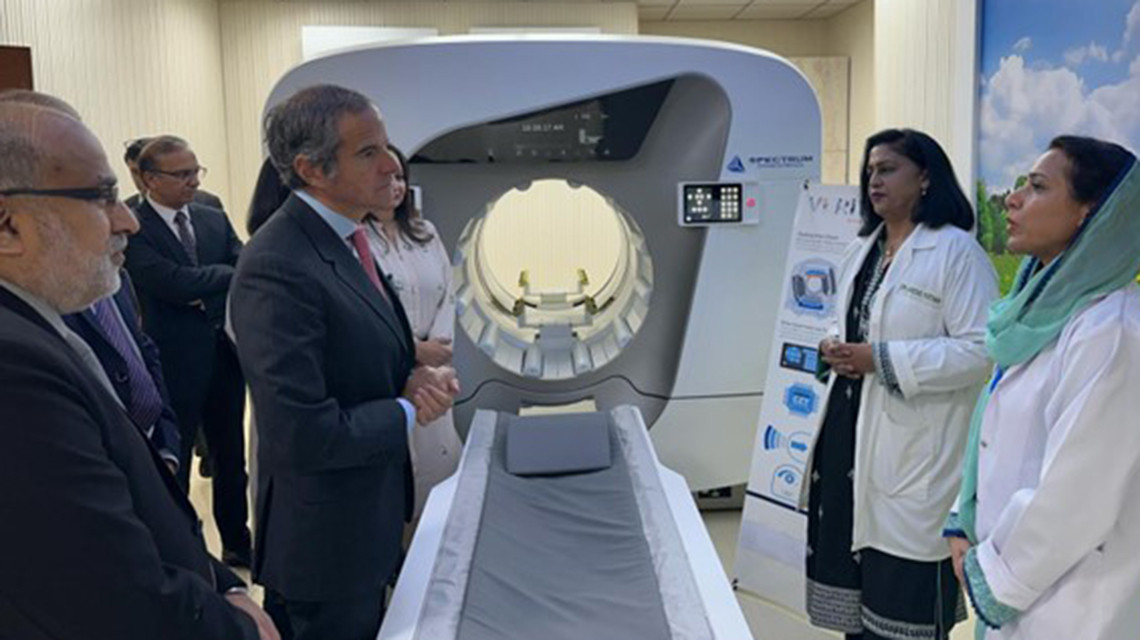IAEA Director General Rafael Mariano Grossi met Prime Minister Shehbaz Sharif in Islamabad on Wednesday, as part of his two-day visit to the Islamic Republic of Pakistan. The two leaders discussed closer cooperation on the peaceful, safe and secure uses of nuclear technology and the importance of multilateralism.
Honored to meet @PakPMO's @CMShehbaz again in Islamabad 🇵🇰 and reaffirm @IAEAorg's commitment to working with Pakistan on its safe and secure peaceful nuclear program.
We also had a valuable exchange on global challenges, as well as the importance of effective multilateralism. pic.twitter.com/90jniJOwTz
— Rafael MarianoGrossi (@rafaelmgrossi) February 12, 2025
The Prime Minister's Office reaffirmed Pakistan's dedication to "further strengthening its collaboration with the IAEA", of which the country is a founding member.
"With the IAEA's support, Pakistan has made significant progress in nuclear power generation, industrial development, healthcare, and agricultural advancements, contributing to the country's socio-economic growth" the statement read.

Mr Grossi met the Deputy Prime Minister of Pakistan and Foreign Minister, Mohammad Ishaq Dar in Islamabad.
Mr Grossi also met the Deputy Prime Minister of Pakistan and Foreign Minister, Mohammad Ishaq Dar, discussing nuclear energy's role in climate change mitigation and adaptation and financing of nuclear power, as well as the peaceful uses of nuclear technology.
Nuclear science and technology are providing clean energy, life-saving cancer care and better food to millions of people in Pakistan. Nuclear techniques and applications are used in agriculture, food preservation and industry.
New Nuclear Reactor Under Construction

Construction recently started on unit 5 at Chashma Nuclear Power Plant.
Pakistan operates six nuclear power reactors at two sites. These generated around 17 per cent of the country's electricity in 2023, both strengthening energy security and mitigating climate change. At Chashma Nuclear Power Plant, 250 kilometres south of Islamabad, four CNP-300 reactors are currently in operation.
Construction recently began on the new Chashma unit 5. Mr Grossi travelled to the site, to view a concrete pouring for the new power reactor and to officially open a new incinerator that will be used for the treatment of radioactive waste.
Cancer Care
The IAEA is helping to upgrade the cyclotron at Pakistan's Institute of Nuclear Medicine and Oncology (INMOL) in Lahore, which is used to produce radiopharmaceuticals used in cancer diagnosis and treatment. The request for the upgrade was made during the IAEA Director General's previous visit to Pakistan in 2023, and Mr Grossi officially inaugurated new facilities at the institute on Thursday. The INMOL and its Nuclear Medicine Oncology and Radiotherapy Centre in Abbottabad have been supported by the IAEA's technical cooperation programme since 2019 to produce novel radiopharmaceuticals for use in theranostic procedures.

Mr Grossi visited Pakistan's Institute of Nuclear Medicine and Oncology (INMOL) in Lahore.
"We are proud and grateful to continue our collaboration with cancer care in Pakistan and beyond. IMOL is a valuable asset in this fight against non-communicable diseases. We will continue and do more together," said Mr Grossi.
Pakistan has 19 Atomic Energy Commission cancer hospitals, providing over a million diagnostic imaging and radiation oncology procedures every year. Pakistan's Nuclear Medicine, Oncology and Radiotherapy Institute in Islamabad was one of the first five anchor centres under the IAEA's Rays of Hope: Cancer Care for All initiative, which aims to widen access to cancer care worldwide.
Women in Nuclear
During his visit to Pakistan, Mr Grossi also participated in an international conference on opportunities for women in nuclear science and emerging technologies, organized by Women in Nuclear Pakistan at Pakistan's nuclear regulatory authority (PNRA).
In a field of excellence like nuclear, we need the best and brightest.
At @IAEAorg we're committed to ensuring opportunities for talent to thrive.
Great to speak at 🇵🇰's #WomenInNuclear conference-an important initiative for an inclusive sector. pic.twitter.com/Ywe4aEUXlx
— Rafael MarianoGrossi (@rafaelmgrossi) February 12, 2025
PNRA hosted an IAEA ConvEx nuclear safety and security exercise in 2024, demonstrating its commitment to global emergency preparedness and response arrangements.
Soil, Crops and Nutrition
The IAEA is helping Pakistan adapt to and mitigate climate change. With IAEA support, scientists at Pakistan's Nuclear Institute for Agriculture and Biology - a joint IAEA and Food and Agriculture Organization collaborating centre - have helped to strengthen food security in the country. They have developed climate resilient and more nutritious food crops, found ways of combatting soil salinization and developed more sustainable cotton varieties.
Summing up the role of nuclear science and technology in achieving sustainable development goals, Mr Grossi gave a keynote address at the National University of Science and Technology on Wednesday.
"The IAEA is helping Pakistan improve healthcare, soil, crops and nutrition - we'll continuing delivering real impact," he said.






